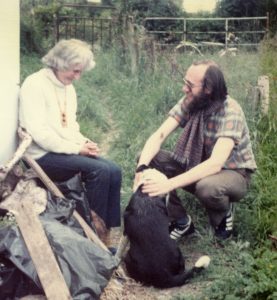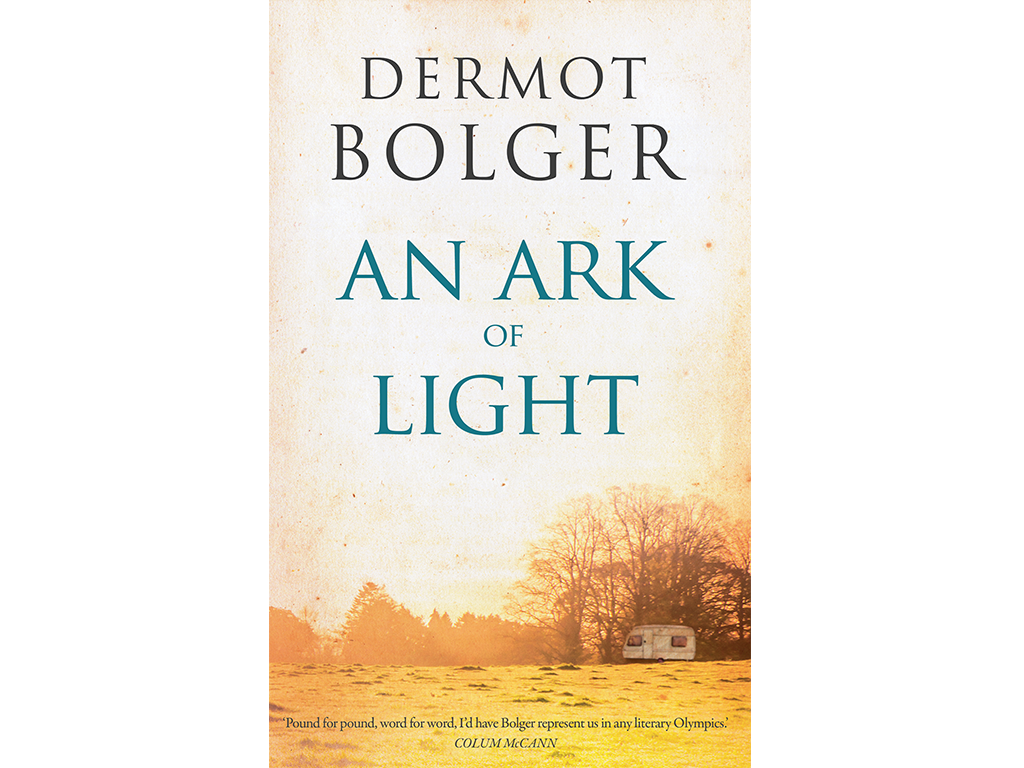An Ark of Light
An Ark of Light
Publisher’s Synopsis
‘There is one thing you must never lose sight of. No matter what life deals you, promise me that you will strive tooth and nail for the right to be happy.’

Having surrendered her happiness to raise her children, Eva Fitzgerald defies convention in 1950s Ireland by leaving a failed marriage to embark on an extraordinary journey of self-discovery. It takes her from teeming Moroccan streets and being flour-bombed in radical marches in London to living in old age in a caravan that becomes an ark for all those whom she befriends amid the fields of Mayo.
An indefatigable idealist, Eva strives to forge her identity while entangled in the fault-lines of her children’s unravelling lives. An Ark of Light is a devastating portrayal of a mother’s anxiety for her gay son in a world where homosexuality is illegal and explores a terse relationship between a mother and daughter with nothing in common beyond love.
Remarkably affecting and gorgeously rendered, this standalone novel completes the real-life story of the unforgettable heroine of Bolger’s bestselling novel, The Family on Paradise Pier, in following a free spirit trying to hold her family together while striving to be happy. This struggle is often heartbreakingly lost, but Eva never loses her indomitable spirit. A towering achievement by one of Ireland’s best-loved authors about the unshakeable bonds of family, the indestructibility of love and the price a woman pays for the right to be herself.
Publication Details and Rights
An Ark of Light is published in paperback and on kindle by New Island and will be published in French by Editions Joelle Losfeld. All rights enquiries should be directed to Edwin Higel, Publisher, edwin.higel@newisland.ie, or Mariel Deegan, General Manager, mariel.deegan@newisland.ie
To purchase this book click http://newisland.ie/product/ark-light/
Reviews
Neil Hegarty, The Irish Times
On a chilly morning in 1954, in her home in south Dublin, Eva Fitzgerald remembers her wedding day 28 years previously – and a vow extracted by her mother: “No matter what hand life deals you, promise me that you will strive tooth and nail for the right to be happy.”
Already, in these early pages of An Ark of Light, Dermot Bolger’s expansive and empathetic new novel, we deduce that Eva’s mother was canny, clear-sighted, and perfectly able to foretell the trajectory of her daughter’s future. The dimensions of an ill-starred coupling will soon show themselves; and Eva’s marriage, to a red-faced, whiskey-loving scion of a declining Co Mayo ascendancy family, has been as ill-starred as they come.Now in this house in Rathgar, we glimpse the wedding day of Eva’s daughter Hazel – and the vow is renewed. It is Eva’s credo, her everything. It is a promise to be grasped with both hands.An Ark of Light has already offered us a portrait of that Mayo marital home. The story of the declining Big House is familiar to an Irish reader: the family home is cold and damp, weeds grow in the avenue, the surrounding lands have been sold off in a (failed, naturally) bid to keep the show on the road; and the Catholic neighbours are eager to see the back of a family that has long outlived its usefulness in the district. We are reminded too that this is a country in which divorce is unobtainable, and in which a woman requires her husband’s permission to open a bank account or hold a passport: cold but necessary notes on an all too recent past, and useful context against which to set Eva’s determination to slough off a life that supplies nothing in the happiness line. And so she must be off: “If she delayed her departure any longer she would grow too cowed to ever take flight.” Against this unprepossessingly chill, dank background, a new life began.Guts and willpower
The house in south Dublin turns out to be a mere staging post in a life lived if not always happily, then certainly with guts and willpower. Bolger’s story spotlights colonial Kenya, where the ghastly lives of settlers, with their pet mongooses and taste for imported English marmalade, are described memorably; 1960s London and provincial England; and – in scenes reminiscent of Colm Tóibín’s The South – the high Pyrenees, with their dry winds and dust. We see too glimpses of lives never lived and destinies unfulfilled, in New Zealand and elsewhere: our futures turn endlessly on pivots, this book suggests, and Eva is more aware than most of the fact that we are tools and not makers of our own destiny.And this in turn means she is painfully aware of the transitory nature of happiness: that is a state to be glimpsed only, maybe, and that for this reason it is all the more precious. Certainly there is little sustained happiness to be taken from her life with her daughter and son: Hazel’s own choices cast shadows over her future; and Eva’s gay son, Francis, is obliged to live as best he can on the edges of a society that will at best tolerate the intolerable.Hard-fought victories
Indeed, Bolger’s novel provides the most vivid of social and cultural contexts. The world around Eva changes and grows, as feminism achieves hard-fought victories, as colonialism gasps and retreats, as Aids runs a scythe through a generation. Ireland and Dublin morph and stretch too: some of this book’s most evocative scenes are set in 1951, as Maura Laverty bellows The Red Flag from the upstairs windows of the Gate Theatre, and Hilton Edwards and Micheál MacLiammóir parade their (in this case, perfectly acceptable) homosexuality downstairs in the lobby, where a production of Tolka Row has just finished.This novel is a continuation of another story: The Family on Paradise Pier (2005) chronicled the earlier lives of Eva’s family; and in a postscript, Bolger details the friendship he sustained over many years with Sheila Fitzgerald, who forms the model of Eva herself. Clearly, this personal dimension is of profound importance to Bolger, and this meshing of fiction and biography adds a new and distinctive layer to what is in essence a homage to a life lived fully. An Ark of Light is an act of appropriation – of a female voice, experience, and sensibility – offered to the reader in a form that is as moving as it is distinctive and respectful.
Grace Keane, RTE Culture
An Ark of Light is a superbly written and beautifully moving book that brought this reader to tears. Not tears of sorrow or even joy, but tears of undeniable appreciation for such a cherished depiction of human character.
Eva Fitzgerald is a fictional character based on the real-life Sheila Fitzgerald whose story the author first explored in his novel, The Family on Paradise Pier. This belated sequel of sorts follows Eva through the latter half of her life. An enduring optimist and idealist, Eva easily forsakes the relative comforts of an unhappy marriage in her bid for adventure and self-discovery.Eva is in her late 40s when she begins her nomadic journey of self-discovery. Although on many occasions her quest seems to fall short, she is determined to find the light or lesson in each chapter in her life. Things are hard for her and where many other people would give in, Eva perseveres with a quiet and gentle determination. Her own life may not follow the path she envisioned or hoped for, but it is nonetheless inspiring to those around her, and those that read of her.She becomes an angel for like-minded travellers, painters, writers and activists, often discovering a sense of kinship with those much younger than her. Whether living in Morocco, London, or a caravan in a field, Eva is determined to make a difference in the world. She signs petitions, attends marches, organises informal art classes, sends letters of encouragement to struggling writers. This feisty individual leaves a mark on the minds and souls of those lucky enough to encounter her, although she doesn’t recognise this at the time.Eva is loving and caring but she is also naive, and at times too soft. She experiences heartbreak and makes mistakes. As I read, I feel like I am watching a friend slip away, as she nears the end of her life.Eva lives a stripped back life, free of material trappings. Friendship and conversation are what drives her - a home, clothes or even often food all come second. She prefers to go without heat to buy a book of philosophy, or go hungry in order to feed stray animals.Bolger does a fabulous job of portraying this fictional version of a dear friend who never got the chance to write her own memoirs. In the postscript, the author thanks her for the gift of friendship and hopes that he has in some way captured her spirit for readers. If his depiction of her essence and character is even but a mere shadow of the woman herself, I would say it is still one of extreme heartfelt appreciation, where the love and respect is honest and tangible.I would have loved to have been lucky enough to meet this woman, and thanks to Dermot Bolger I feel in some small way that I have. Eva has most certainly left her mark on me, and I am sure mine will not be the only readers’ heart to be touched.
Garry Bannister, The Gloss Magazine
Another masterpiece from Dermot Bolger’s pen. If you enjoyed The Family on Paradise Pier then you will certainly relish this splendidly crafted continuation which brings vividly to life the main character Eva Fitzgerald. Bolger has a luxurious and detailed approach that injects a powerful sense of realism and authenticity into all his work.
